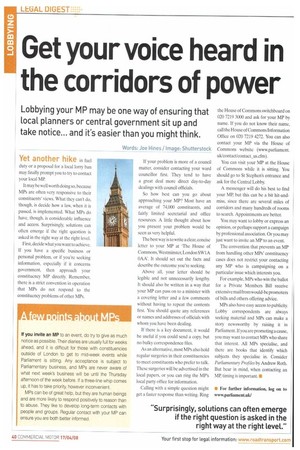Get your voice heard in the corridors of power
Page 40

If you've noticed an error in this article please click here to report it so we can fix it.
Lobbying your MP may be one way of ensuring that local planners or central government sit up and take notice.., and it's easier than you might think.
Words: Joe Hines / Image: Shutterstock
Yet another hike in fuel duty or a proposal for a local lorry ban may finally prompt you to try to contact your local MP It may be well worth doing so, because MPs are often very responsive to their constituents' views. What they can't do, though, is decide how a law, when it is passed, is implemented. What MPs do have, though, is considerable influence and access. Surprisingly, solutions can often emerge if the right question is asked in the right way at the right level.
First, decide what you want to achieve. If you have a specific business or personal problem, or if you're seeking information, especially if it concerns government, then approach your constituency MP directly. Remember, there is a strict convention in operation that MPs do not respond to the constituency problems of other MPs. If your problem is more of a council matter, consider contacting your ward councillor first. They tend to have a great deal more direct day-to-day dealings with council officials.
So how best can you go about approaching your MP? Most have an average of 74,000 constituents, and fairly limited secretarial and office resources. A little thought about how you present your problem would be seen as very helpful.
The best way is to write a clear, concise letter to your MP at 'The House of Commons, Westminster, London SW1A OAA. It should set out the facts and describe the outcome you're seeking.
Above all, your letter should be legible and not unnecessarily lengthy. It should also be written in a way that your MP can pass on to a minister with a covering letter and a few comments without having to repeat the contents first. You should quote any references or names and addresses of officials with whom you have been dealing.
If there is a key document, it would he useful if you could send a copy, but no bulky correspondence files.
As an alternative, most MPs also hold regular surgeries in their constituencies to meet constituents who prefer to talk. These surgeries will be advertised in the local papers, or you can ring the MP's local party office for information.
Calling with a simple question might get a faster response than writing. Ring the House of Commons switchboard on 020 7219 3000 and ask for your MP by name. If you do not know their name, call the House of Commons Information Office on 020 7219 4272. You can also contact your MP via the House of Commons website (www.parliament. uk/contact/contact_us.cfm).
You can visit your MP at the House of Commons while it is sitting. You should go to St Stephen's entrance and ask for the Central Lobby.
A messenger will do his best to find your MP, but this can be a bit hit-andmiss, since there arc several miles of corridors and many hundreds of rooms to search. Appointments are better.
You may want to lobby or express an opinion, or perhaps support a campaign by professional association. Or you may just want to invite an MP to an event.
The convention that prevents an MP from handling other MPs' constituency cases does not restrict your contacting any MP who is campaigning on a particular issue which interests you.
For example, MPs who win the ballot for a Private Members Bill receive extensive mail from would-be promoters of bills and others offering advice.
MPs also have easy access to publicity. Lobby correspondents are always seeking material and MPs can make a story newsworthy by raising it in Parliament. If you are promoting a cause, you may want to contact MPs who share that interest. All MPs specialise, and there are books that identify which subjects they specialise in. Consider Parliamentary Profiles by Andrew Roth. But bear in mind, when contacting an MP, timing is important. •




























































































































































































